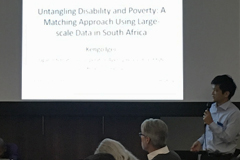Research Assistant Kengo Igei Presents Findings of Empirical Research on Disability and Poverty in South Africa at a UN Meeting of Experts
2017.01.27
Kengo Igei, a research assistant at the JICA Research Institute (JICA-RI), has been conducting empirical research related to multidimensional poverty among persons with disabilities in South Africa. He presented the findings of his research at a meeting of experts on disability statistics that was held at Statistics South Africa on December 7 through 9, 2016.
Igei took part in the 16th Meeting of the Washington Group on Disability Statistics that was established under the direction of the United Nations Statistical Commission, which is part of the United Nations Economic and Social Council. The Washington Group develops and promotes standard methodology related to the collection of data on persons with disabilities for which international comparison is possible. The first meeting was held in Washington in 2002. Since then, the meeting has been held most years in a variety of countries.
Approximately 40 people participated in the meeting, including disability statistics researchers affiliated with research institutes in Europe and the U.S. and representatives from the statistical offices of each country. At the meeting, reports were given on creating the analytical guideline of the extended set of questions, development of indicators to measure children’s disabilities and mental health, and cases in which the questions recommended by the Group were included in surveys for education and employment. In the latter half of the meeting, reports were given in accordance with the status and statistics of monitoring persons with disabilities in each country. Igei gave his presentation in the "Disability Measurement in Africa" session.

Kengo Igei, JICA-RI research assistant, presents the findings of his
research
In his research, persons with disabilities were matched with those without disabilities who had similar personal and environmental factors other than a disability (age, gender, race, municipality, etc.) in order to reduce biases in analysis arising from two-way causal relationships between disability and poverty. He compared multidimensional poverty indicators created based on education, employment, income, standard of living, etc. A unique aspect was that the analysis was conducted in subgroups categorized by type and severity of the disability, age group, gender, race, type of residence area, etc.
Igei’s presentation included the following as the findings of empirical research.
There were discussions in other sessions as well regarding two-way causal relationships between disability and poverty and the importance of the disaggregation of analysis. The presentation garnered high attention, including comments such as "This type of detailed analysis is unprecedented" and "I want to conduct this type of analysis on data for my own country as well."
Igei later made a comment, saying "The significance of this research was reaffirmed through my participation in this meeting. The response from participants from the South African government was favorable as well, and they told me that they would welcome this type of expert analysis."

事業事前評価表(地球規模課題対応国際科学技術協力(SATREPS)).国際協力機構 地球環境部 . 防災第一チーム. 1.案件名.国 名: フィリピン共和国.

事業事前評価表(地球規模課題対応国際科学技術協力(SATREPS)).国際協力機構 地球環境部 . 防災第一チーム. 1.案件名.国 名: フィリピン共和国.

事業事前評価表(地球規模課題対応国際科学技術協力(SATREPS)).国際協力機構 地球環境部 . 防災第一チーム. 1.案件名.国 名: フィリピン共和国.

事業事前評価表(地球規模課題対応国際科学技術協力(SATREPS)).国際協力機構 地球環境部 . 防災第一チーム. 1.案件名.国 名: フィリピン共和国.

事業事前評価表(地球規模課題対応国際科学技術協力(SATREPS)).国際協力機構 地球環境部 . 防災第一チーム. 1.案件名.国 名: フィリピン共和国.
scroll